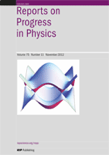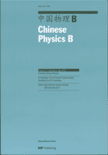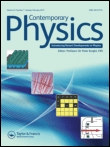
Revista Cubana de Fisica
Scope & Guideline
Advancing Physics and Astronomy for a Global Audience
Introduction
Aims and Scopes
- Theoretical Physics:
Research in theoretical physics, including foundational theories, quantum mechanics, and statistical physics, is a core focus of the journal, contributing to a deeper understanding of physical laws. - Applied Physics and Engineering:
The journal emphasizes applied physics, particularly in engineering contexts, covering topics such as materials science, nanotechnology, and energy systems. - Education in Physics:
A significant area of interest includes pedagogical approaches to teaching physics, exploring innovative methods and tools to enhance learning in educational settings. - Astrophysics and Cosmology:
The journal features research in astrophysics, including observational studies and theoretical models that contribute to our understanding of the universe. - Medical Physics:
Research related to medical physics, including dosimetry and imaging techniques, reflects the journal's commitment to interdisciplinary applications of physics. - Environmental Physics:
Topics addressing climate change, environmental monitoring, and sustainable practices highlight the journal's engagement with current global challenges. - Emerging Technologies:
The journal covers developments in emerging technologies such as artificial intelligence and computational methods, indicating a forward-looking approach to physics research.
Trending and Emerging
- Interdisciplinary Research:
There is a growing trend towards interdisciplinary research that integrates physics with other fields such as biology, engineering, and environmental sciences, reflecting the need for collaborative approaches to complex problems. - Advanced Computational Methods:
The increasing use of computational methods, such as Monte Carlo simulations and molecular dynamics, indicates a trend towards more sophisticated analytical techniques in physics research. - Sustainable Energy Solutions:
Research focusing on sustainable energy technologies, including small modular reactors and photovoltaic materials, is on the rise, highlighting the journal's engagement with global energy challenges. - Innovative Learning Tools:
The emergence of innovative educational tools and methods, such as virtual laboratories and problem-based learning, signifies a commitment to improving physics education. - Quantum Technologies:
The exploration of quantum technologies, including quantum computing and quantum communication, is gaining traction, reflecting the growing importance of quantum mechanics in modern physics. - Health Physics Applications:
The journal is increasingly addressing health physics applications, including advancements in medical imaging and radiation therapy, showcasing the relevance of physics in healthcare.
Declining or Waning
- Classical Mechanics:
Research focused on classical mechanics has seen a notable decline, possibly due to the increasing prevalence of advanced computational methods and theoretical approaches overshadowing traditional topics. - Historical Studies in Physics:
Papers dedicated to the historical aspects of physics and figures in physics have become less frequent, suggesting a shift towards more contemporary and applied research themes. - Low-Level Nuclear Physics:
Topics related to low-energy nuclear physics appear to be waning, as the journal's focus has shifted toward practical applications and interdisciplinary research. - Traditional Experimental Techniques:
There has been a reduction in the publication of studies utilizing traditional experimental techniques, indicating a move towards more innovative and automated methodologies.
Similar Journals

Journal of Siberian Federal University-Mathematics & Physics
Innovative Research for a Changing WorldJournal of Siberian Federal University-Mathematics & Physics, published by the Siberian Federal University, is an esteemed academic journal dedicated to the fields of mathematics and physics. With an ISSN of 1997-1397 and an E-ISSN of 2313-6022, this journal aims to foster innovative research and discourse by providing a platform for the dissemination of high-quality studies and advancements in these disciplines. While the journal is categorized in the third quartile (Q3) for both mathematics and physics as of 2023, it serves as a vital resource for researchers, professionals, and students seeking insights and developments within the Russian educational context and beyond. The journal supports an open access model, enhancing the visibility and accessibility of its content. With its publication horizon set from 2014 to 2024, the journal continues to contribute to the global body of knowledge, making it relevant for those engaged in the pursuit of academic excellence.

Nature Reviews Physics
Unveiling the Latest Breakthroughs in Physics.Nature Reviews Physics is a leading academic journal published by NATURE PORTFOLIO, specializing in the realm of physics and astronomy. With a significant impact factor that places it among the top-tier journals in its field, it has achieved a remarkable ranking of 3rd out of 243 according to Scopus, reflecting its influential position and 98th percentile standing in general physics and astronomy. This prestigious journal, with an expected convergence spanning from 2019 to 2024, provides comprehensive reviews that capture the latest advancements and critical developments in physics, deemed essential for researchers, professionals, and students alike. While the journal does not currently adopt an open-access model, its scholarly contributions and insights into cutting-edge research make it a vital resource for those seeking to advance their understanding of the complexities of the physical universe.

REVISTA MEXICANA DE FISICA
Exploring the Frontiers of Physics Education and ResearchREVISTA MEXICANA DE FISICA is a prominent academic journal dedicated to advancing knowledge in the fields of Physics and Education. Published by the SOC MEXICANA FISICA, this journal plays a pivotal role in disseminating innovative research and educational methodologies from Mexico and beyond. With a publication history that spans from 1991 to 2024, it has established itself as an essential resource for researchers, professionals, and students who seek to deepen their understanding of general physics and astronomy. The journal is classified in the Q3 quartile in both education and physics & astronomy, showcasing its quality and relevance within the academic landscape. While the journal currently operates on a subscription basis, it provides a valuable platform for emerging voices and established scholars alike. By fostering a collaborative environment for scientific discourse, REVISTA MEXICANA DE FISICA continues to be an important channel for the ongoing evolution of scientific education and exploration in the physical sciences.

CHINESE PHYSICS LETTERS
Elevating Global Physics Discourse Since 1984Chinese Physics Letters is a prestigious journal published by IOP Publishing Ltd, based in the United Kingdom. Since its inception in 1984, the journal has served as a vital platform for disseminating impactful research in the field of physics, achieving a noteworthy Q1 ranking in the category of Physics and Astronomy (miscellaneous) as of 2023. Renowned for its rapid publication process, this journal is dedicated to providing a forum for high-quality, concise articles that address innovative theoretical and experimental findings relevant to both the academic community and industry practitioners. With an impressive Scopus rank of #52 out of 243, placing it in the 78th percentile, Chinese Physics Letters continues to influence the global physics landscape. Researchers, professionals, and students alike find this journal indispensable for staying abreast of the latest developments and trends in physics.

Nuovo Cimento C-Colloquia and Communications in Physics
Advancing Knowledge from 1978 to TodayNuovo Cimento C-Colloquia and Communications in Physics is a distinguished peer-reviewed journal published by the SOC ITALIANA FISICA, dedicated to the dissemination of novel research and communications in the vibrant fields of Astronomy and Physics. Established in 1978, this journal provides a platform for scientists and researchers to present their findings, fostering academic dialogue and collaboration within the community. As of 2023, the journal holds a Q4 quartile ranking in both Astronomy and Astrophysics and Physics and Astronomy (miscellaneous), reflecting its commitment to contributing to the scientific corpus despite its emerging status in the competitive landscape. Based in Italy, the journal is accessible to a global audience, enhancing its reach and influence. Although currently not an open access journal, it remains an essential resource for researchers and professionals seeking to stay informed on cutting-edge developments in physics and astronomy. Its ongoing convergence of knowledge from 1978 to 2024 promises to enrich the scholarly discourse and advance the frontiers of research in these dynamic fields.

REPORTS ON PROGRESS IN PHYSICS
Charting new territories in the realm of physics and astronomy.Reports on Progress in Physics is a prestigious scholarly journal published by IOP Publishing Ltd, based in the United Kingdom. With an illustrious history dating back to 1934, this journal serves as a vital resource for researchers and professionals in the fields of physics and astronomy, offering comprehensive overviews of significant developments in these disciplines. It holds a commendable Q1 classification in both Medicine (miscellaneous) and Physics and Astronomy (miscellaneous) categories, further underscored by its impressive ranking as 4th out of 243 in the general physics and astronomy sector, placing it in the top 2% percentile on Scopus. The journal is dedicated to disseminating high-quality, peer-reviewed articles that facilitate the understanding of complex physical phenomena and their applications. Although it does not currently offer open access options, its rigorous editorial standards ensure that only the most impactful research reaches its wide audience of academics, practitioners, and students, solidifying its role as a cornerstone of knowledge in the physical sciences.

Chinese Physics B
Empowering researchers to share their physics journey.Chinese Physics B, published by IOP Publishing Ltd, is a distinguished journal in the field of Physics and Astronomy, offering a platform for researchers to disseminate cutting-edge studies and advancements. With an ISSN of 1674-1056 and an E-ISSN of 2058-3834, this journal emphasizes open access, ensuring that groundbreaking research is readily available to a global audience. Reflecting its commitment to quality, Chinese Physics B is categorized in the Q3 quartile (2023) in its subject area and ranks 118 out of 243 among its peers in general physics and astronomy according to Scopus, placing it in the 51st percentile. Publishing since 2008, the journal not only maintains a rigorous peer-review process but also aims to foster collaboration among academics in various physics disciplines. With its base in the United Kingdom, Chinese Physics B remains a crucial resource for those seeking to stay abreast of developments in the diverse world of physics.

CANADIAN JOURNAL OF PHYSICS
Innovative research shaping the future of physical sciences.The Canadian Journal of Physics, with ISSN 0008-4204 and E-ISSN 1208-6045, is a prominent publication in the field of physics, published by Canadian Science Publishing. Established in 1970, this journal serves as a vital platform for disseminating groundbreaking research and innovative findings across a spectrum of topics within physics and astronomy. With a current Q3 ranking in the miscellaneous category and a respectable Scopus rank of 130 out of 243, the journal ranks within the 46th percentile, confirming its relevance and contribution to the scientific community. Researchers, professionals, and students are encouraged to submit their work for consideration in this esteemed journal, which aims to foster scholarly exchange and advance knowledge in the physical sciences. Although the journal operates under a traditional access model, its rich archive and contemporary insights ensure that it remains a critical resource for anyone invested in the dynamics of physics.

CONTEMPORARY PHYSICS
Exploring the Frontiers of Physics and AstronomyCONTEMPORARY PHYSICS, published by Taylor & Francis Ltd, stands as a notable journal in the field of physics and astronomy, offering a comprehensive platform for the dissemination of cutting-edge research and developments since its inception in 1959. With an Impact Factor that reflects its solid position within the academic community, as evidenced by its Q2 ranking in the 2023 category of Physics and Astronomy (miscellaneous) and a Scopus Rank of 111 out of 243, this journal plays an essential role in bridging theoretical advances and practical applications. Researchers and professionals are encouraged to explore its diverse scope, which aims to foster innovative ideas and foster interdisciplinary collaboration. Although not currently an open access journal, CONTEMPORARY PHYSICS is committed to maintaining the highest standards of editorial excellence and provides valuable insights across converged eras of research from 1959 to 2024, making it indispensable for those dedicated to advancing their knowledge and contributions in the realm of physics.

JOURNAL OF THE KOREAN PHYSICAL SOCIETY
Your Gateway to the Latest in Physics and AstronomyJOURNAL OF THE KOREAN PHYSICAL SOCIETY is a prominent academic journal dedicated to advancing the field of physics, published by the prestigious Korean Physical Society. With its extensive contribution to the scientific community since its inception in 1996, this journal serves as an essential platform for the dissemination of innovative research findings in various branches of physical science. Despite its current categorization in Q4 and a ranking reflecting its early-stage impact relative to peers, it remains a valuable resource for researchers, professionals, and students eager to explore developments in general physics and astronomy. The journal is accessible in both print and electronic formats, making it convenient for a global audience. Each issue aims to foster collaboration and knowledge-sharing within the field, ensuring that it remains relevant and instrumental in shaping future research directions. Located in South Korea, the journal continues to nurture a vibrant academic community, contributing to the ongoing dialogue in the global scientific arena.